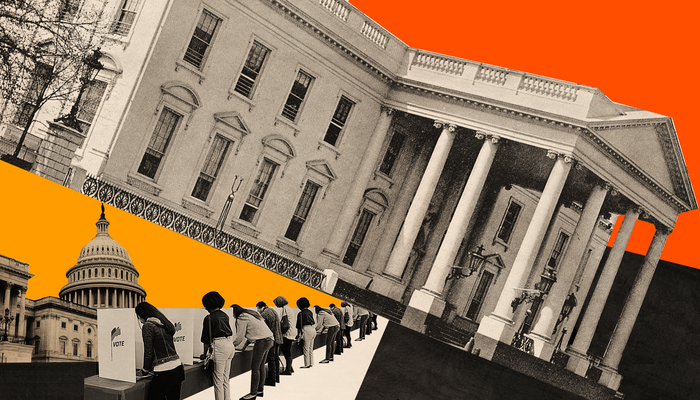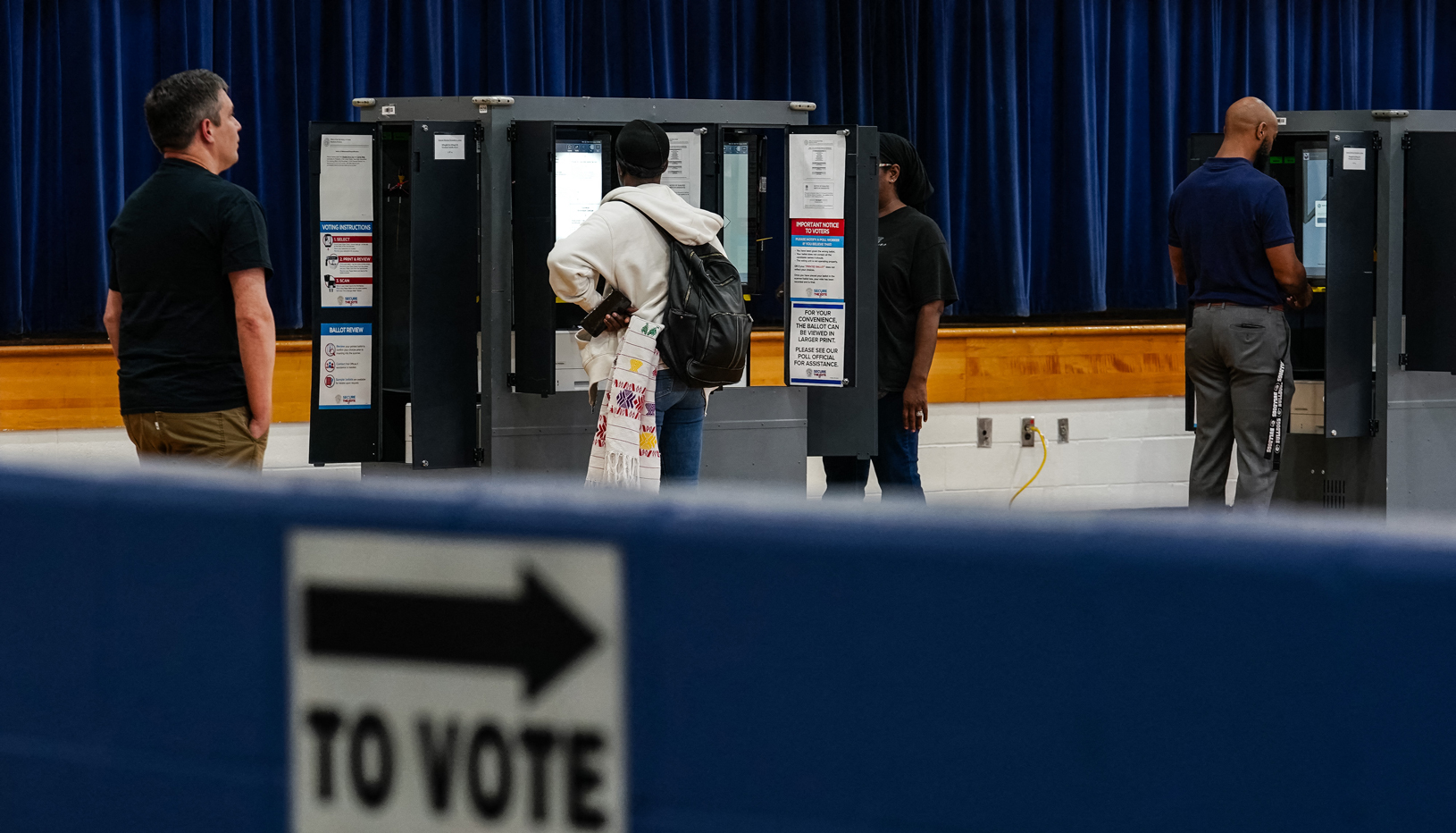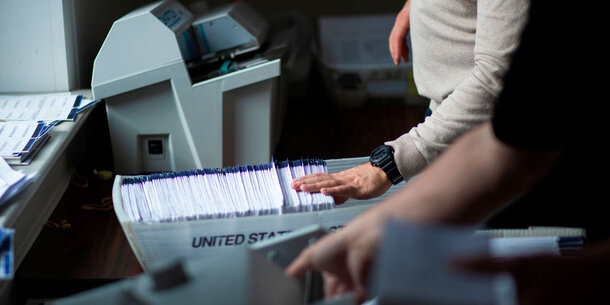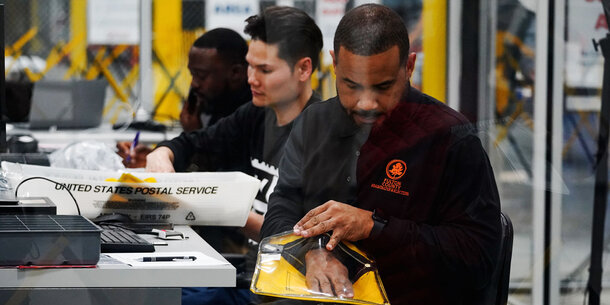Targeting Election Officials and Civil Society
The Trump administration, falsely claiming that the 2020 presidential election was stolen, has already targeted organizations and individuals it sees as adverse with baseless or inappropriate retaliatory actions. It now threatens to do the same with certain election officials, civic groups that mobilize voters, and other individuals and entities that protect elections and the rule of law. These kinds of actions can be tools of retribution, intimidation, or coercion.
Weaponizing Federal Agencies
A set of new federal task forces — the DOJ’s Weaponization Working Group, the New Jersey U.S. Attorney’s Office Election Integrity Task Force, and the Washington, D.C., Attorney’s Office Special Unit: Election Accountability — establish a federal law enforcement approach to elections focused on targeting voters, election officials, perceived political adversaries, and journalists. The task forces devote resources to search for supposedly widespread voter fraud — a problem that doesn’t exist — and sanction political targeting.
“They are poised to enable election interference by investigating perceived adversaries, targeting election officials, and casting doubt on election systems.”
Political appointees who have spread falsehoods about the outcome of the 2020 election, including U.S. Attorney General Pam Bondi, Assistant Attorney General Harmeet Dhillon, and FBI Director Kash Patel, have empowered and enabled these task forces. Bondi, Dhillon, and Patel have also made clear they are willing to use the federal government to investigate and prosecute people they claim are responsible for supposed election fraud. Patel has stated, “We’re going to come after the people in the media who lied about American citizens, who helped Joe Biden rig presidential elections — we’re going to come after you.” Bondi, in one of her first actions as attorney general, created the Weaponization Working Group, whose purpose is to “review the activities of all departments and agencies exercising civil or criminal enforcement authority of the United States over the last four years.” The administration has instructed the group to investigate some of the president’s perceived enemies, including former Special Counsel Jack Smith and his staff for investigating the January 6 riots, the Manhattan district attorney and the New York state attorney general for their involvement in the prosecution of Trump and his businesses, and anyone who investigated or prosecuted the January 6 rioters.
Impact: During President Trump’s first term in office, federal agencies and departments occasionally served as a restraint on his unlawful actions. For example, when the president asked the attorney general to seize voting machines after his 2020 election loss, then Attorney General Bill Barr refused. But in his second term, the president’s picks may not hold the line in the same way. Rather, they are poised to enable election interference by investigating perceived adversaries, targeting election officials, and casting doubt on election systems.
Why It’s Wrong: The DOJ can and should prosecute fraud in U.S. elections, but these task forces are premised on the false notions that U.S. elections are rigged and that there’s rampant voter fraud. Rather than ensuring election integrity, these task forces undermine it, part of the department’s serious shift away from protecting voting rights.
Status: The Constitution and the law serve as a limit on what these political appointees can do. Indeed, courts have already struck down this administration’s attempts to subvert the law. For example, multiple courts have found that the president’s executive orders targeting law firms violate the First Amendment, and two courts have preliminarily stopped the president from unlawfully trying to direct an independent, bipartisan agency to add a citizenship document requirement to the federal voter registration form.
Penalizing Law Firms
The president issued executive orders revoking the federal security clearances of six law firms and prohibiting the federal government from contracting with them. These firms had been involved in litigation protecting voting rights and are associated with people who challenged the January 6 attack on the Capitol, attempts to overturn the 2020 election, and election interference in 2016. The president specifically cited these associations as justification for targeting the firms. For example, the Paul Weiss order was based in part on the firm employing a lawyer who brought a lawsuit against an individual who had participated in the January 6 insurrection. The Perkins Coie order provided that the firm had represented a political opponent of the president, brought challenges to restrictive voter ID laws that made it harder for eligible citizens to vote, and, as the court enjoining the order stated, brought “election-related lawsuits . . . challenging actions supported by the president or his campaign.” Jenner & Block was targeted because it employed Andrew Weissman, who, as the court enjoining the order stated, “drew presidential disdain” for criticizing the president and participating “in a legitimate investigation of election interference” — that is, the investigation and prosecution of the president’s campaign team for crimes related to foreign interference in the 2016 election. The association with Weissman “extended that disdain to the firm,” the court added. And Covington & Burling, according to the executive order, “assisted former Special Counsel Jack Smith.” The firm had provided Smith with free legal advice when he was investigating the January 6 riots.
Impact: By targeting law firms for providing legal services — including free legal services — to causes the administration disapproves of, including protecting the freedom to vote, the orders have had a chilling effect on firms, including those that have not been directly targeted, diminishing the legal resources available to Americans whose voting rights have been violated. To some extent, the nonprofit sector and state attorneys general have stepped up to provide needed legal support, but gaps remain. This chilling effect extends beyond law firms. For instance, it may compel prosecutors to avoid pursuing charges against election interference. And the administration’s attempt to punish some of the most powerful and well-resourced legal institutions in the country sends a potent message to anyone considering taking a position the administration may oppose.
Why It’s Wrong: As multiple courts have found, these actions are illegal. The First Amendment prohibits government officials from retaliating against protected speech or association, including retaliating against law firms that represent or offer legal services to those engaged in protected speech or association whom the president happens to disfavor.
Status: Four of the targeted law firms challenged their respective executive orders, and judges have permanently blocked the orders for violating the First Amendment. Despite the clear illegality of the orders, nine firms have entered into agreements with the administration. As part of those agreements, these firms said they would provide free legal services for causes that the president approves of.
Threatening Election Officials and Nonprofits
The president and his DOJ appointees have repeatedly threatened to prosecute the election officials who administered the 2020 election. In a March 14, 2025, speech, President Trump stated, “What a difference a rigged and crooked election had on our country. And the people who did this to us should go to jail. They should go to jail.” The president has also threatened to target nonprofit advocacy groups that play an important role in voter engagement, election monitoring, and litigation to protect the freedom to vote.
These threats roughly track a proposal in Project 2025, the controversial conservative policy agenda created by the Heritage Foundation, to prosecute people who protected the 2020 election with federal crimes. Project 2025 proposed charging election officials with criminal conspiracy to injure civil rights for their alleged misapplication of state law to help voters cast ballots during the 2020 election.
“Federal and state law prohibits anyone, including federal officials, from intimidating voters and those, like election officials or civic engagement organizations, who assist or encourage them to vote.”
The extent to which the administration will follow through on that plan is unclear, but it has already begun to target officials involved in protecting the 2020 election and build an infrastructure of task forces and working groups that heightens the threat of criminal prosecution. In one executive order, the president directed the DOJ to review the actions of Chris Krebs, whom the president appointed to lead the federal Cybersecurity and Infrastructure Security Agency (CISA) in 2018, because he “denied that the 2020 election was rigged and stolen.”
In addition to its Weaponization Working Group, the DOJ is reportedly exploring ways to criminally charge election officials for failing to maintain proper cybersecurity — based not on evidence but on assumptions driven by false claims of rampant voter fraud.
Impact: Criminal investigations and prosecutions would impose a severe personal and financial toll on election officials or nonprofit employees for simply doing their jobs to help keep elections free and fair. But beyond that, the harms that stem from targeting the officials and civil society groups that make our elections work are manifold.
Even if the administration never charges any officials, the threat alone of criminal investigation or prosecution will likely exacerbate the exodus of election officials from their jobs. In 2024 33 percent of local election officials knew at least one colleague who resigned at least in part due to fear for their safety, of increased threats, or of intimidation; 21 percent stated that they were unlikely to continue serving in their role for the 2026 midterms. In 2025 59 percent of officials reported fear of political interference in their ability to do their jobs. And 46 percent were very or somewhat concerned about potential politically motivated investigations of themselves or their peers. Ultimately the drain of experienced officials from U.S. elections will hurt voters.
The threat of criminal investigation may also prompt civil society organizations to retreat from their work to engage voters. When Florida recently passed a law threatening organizations conducting voter registration drives with civil and criminal penalties for violating a slew of new restrictive regulations, some organizations curtailed their work or stopped registering voters altogether.
The administration may also use the threat of criminal prosecution to pressure election officials to comply with unreasonable or unlawful requests. It may already be engaging in similar quid pro quo arrangements, as evidenced when the DOJ dropped corruption charges against New York City Mayor Eric Adams in the spring of 2025. Though the court ultimately ordered the case dismissed with prejudice (i.e., barring a future claim on the same facts), the DOJ had sought dismissal without prejudice, which would have left open the opportunity for the case to be refiled at a later time, and thus would have allowed the DOJ to hold the threat of prosecution over Adams should he not acquiesce to any requests the administration may make. The U.S. attorney responsible for the prosecution, who had been appointed by the president, resigned in protest, alleging that the decision was motivated by a desire to procure political cooperation from Adams on unrelated matters.
An election official fearful of criminal charges might succumb to pressure to aggressively purge voters from the rolls or to engage in outright election subversion. When the president tried to overturn the 2020 presidential election, he and his associates put pressure on state and local election officials — including, famously, in a phone call to Georgia Secretary of State Brad Raffensperger — to assist his efforts. Raffensperger and other officials refused to subvert the results, but an election official facing the prospect of prosecution now might not take the same principled stand.
Why It’s Wrong: Threats of criminal charges based on lies about the 2020 election have no legal or factual basis. There is no evidence that the 2020 election was tainted by any kind of fraud or impropriety in election administration. Project 2025 proposes to use a law designed to protect civil rights, including the right to vote, to prosecute state officials for aiding in the exercise of that right, a legal theory that will likely struggle in court.
The First Amendment protects election officials and pro-voter groups from retaliation based on their speech and association, just as it protects the speech and association of law firms. If the administration targets officials or groups for publicly declaring elections to be legitimate, safe, and secure or for registering and engaging voters, the targets may be able to block any investigation or prosecution in court before it proceeds, just as those law firms have succeeded in blocking the executive orders leveled at them.
Moreover, federal and state law prohibits anyone, including federal officials, from intimidating voters and those, like election officials or civic engagement organizations, who assist or encourage them to vote. And though voters rarely do so, they are able to sue DOJ officials under anti-intimidation law in federal court.
Status: Thus far these threats have remained just that. For example, DOJ lawyers tasked with finding ways to prosecute election officials for allegedly failing to maintain proper cybersecurity are reportedly struggling to find any criminal statute that will allow them to do so.




